Are Kenyans seeking a buffer zone in Somalia?
- Published
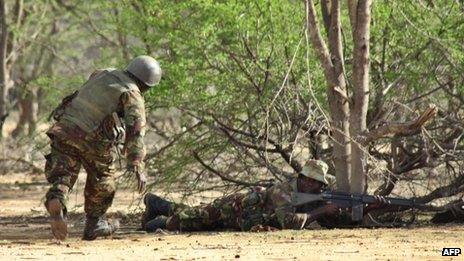
As Kenya's troops continue their incursion into southern Somalia in pursuit of Islamist militants, the BBC's Will Ross considers the motives behind the deployment.
"I hope in three or four months, al-Shabab will have been removed from our region. Then one day I'll invite you to come to Kismayo to see what's going on," said Abdullahi Shafi, personal assistant to the governor of Somalia's Lower Juba region.
He is hopeful that with Kenyan military help, he can soon return home to a new semi-autonomous region in southern Somalia.
"We have been in hell for the last 20 years. We need a new Somalia," he said, wearing a T-shirt emblazoned with "Azania" - the name of the new region which comprises Gedo, Lower Juba and Middle Juba.
It already has a flag - blue, white and red - a parliament, a house of elders and a president in waiting.
The Kenyan government says it sent troops to Somalia to fight al-Shabab, whom it blames for the recent kidnappings of tourists and aid workers.
"Kenya has the capacity, the ability and the will to defend its territory and its people," said Moses Wetangula, Kenya's foreign minister.
But analysts point out that for several years Kenya, with international support, has been pushing for Azania, traditionally known as Jubaland, to be set up.
Kenya has trained and equipped Somali troops, as it would like a buffer zone to shield its territory from lawless Somalia.
So some analysts see the kidnappings as just a convenient excuse for carrying out the plan militarily.
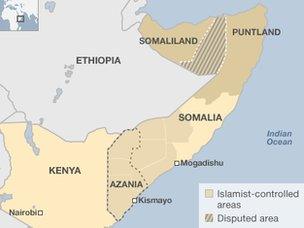
The army has been giving unverifiable reports of success across the border.
The Kenyan media, which have scarcely questioned the motive for going to war, have told the country about captured towns that no one has ever heard of.
One front page article referred to the "imminent fall of Kismayo".
For now, the cautious voices are being drowned out.
"It's not going to be easy for Kenya to stabilise and pacify that part of Somalia, much less drive out al-Shabab," said Rashid Abdi, of the International Crisis Group.
"I think the Kenyans are into a very long and messy intervention in Somalia."
Rich in oil?
The man who hopes to soon end his absentee presidency says the creation of Azania, in April, came about following the consultation of more than 30 clans.
He says he is not a separatist, but speaks of a bright future for his people in a Somalia where power is devolved from Mogadishu.
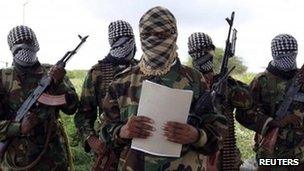
Al-Shabab has threatened retaliatory attacks in Kenya
"Our priority will be to consolidate the peace, set up the administration and re-establish education and health systems before we move on to development and infrastructure," Somali MP Professor Mohammed Abdi Gandhi told me in Nairobi.
Asked where he got his last name from, he smiled and replied, "Because I'm against violence."
A geologist with dual French and Somali nationality, he has critics who accuse him of imposing what some call the "Gandhi plan" without being all-inclusive.
"They met at a hotel in Naivasha where Professor Gandhi was proclaimed the president. Everybody clapped. The constitution was produced. They all clapped again, even though they hadn't even read it," one critic told me.
In response, Mr Gandhi says the process has been as inclusive as possible with dozens of consultative meetings.
There are reports that Azania - or at least the sea off its coast - is rich in oil.
Mr Gandhi, a former Somali defence minister, has worked as a consultant for the French oil giant Total. This and this has led some to conclude that countries including France and Norway have thrown money at the Azania project.
"These are all rumours. Not true," he says.
"To my knowledge, there are no groups or companies that have come to us. When it's peaceful, then we will open the door and all the international oil companies can come to explore. Nothing is under the table."
Centralised power has not worked well in Somalia.
The war has kept the government confined to the capital Mogadishu and, more often than not, to hotels in Nairobi.
As Puntland and Somaliland and several other states break away, a devolved form of government is seen as better way forward, as long as it is well planned and not done through the gun alone.
"Ideally, Somalis should have been given the opportunity to plan for a federal state in a gradual, consensual way," says Mr Abdi.
"Right now, we have clans competing among themselves to carve out clan enclaves or cantons in various parts of Somalia. I don't think clan states are the way forward for Somalia."
Ethiopian factor
Somali government officials have given mixed reactions to the Kenyan incursion.

Kenyan troops are fighting alongside a Somali militia against al-Shabab
President Sheikh Sharif Sheikh Ahmed said the government was grateful for logistical support but said the Kenyans should stay out of Somalia - a comment which drew this response from the president of Azania.
"Sheikh Sharif doesn't want change. To prolong his power, he wants the status quo. He wants al-Shabab to stay. He is a big obstacle to peace. He has done a lot to block our programme," Professor Gandhi told me - without ruling out the possibility of this stance leading to armed conflict between the president's and his soldiers.
"If he keeps the status quo, he can convince the international community that he is fighting al-Shabab. He needs more help and more time. For him, all he has in mind is to stay in power."
The controversial issue of foreign troops in Somalia could complicate the Kenyan mission.
Some analysts suggest it could even help bolster al-Shabab, which has played the nationalist card before.
The Kenyans are fighting alongside a militia run by Sheikh Ahmed Madobe - a man who does not see eye-to-eye with Mr Gandhi.
As well as this potential source of tension, there is also concern that clan rivalries could break out if the common enemy of al-Shabab is dealt with.
Then there is the Ethiopia factor.
Analysts say Addis Ababa is strongly opposed to Azania being set up.
The fear is Ethiopian Somalis of the Ogaden clan may seek support or refuge across the border in Azania which is inhabited mainly by people of the Ogaden clan.
As for Kenya, it clearly had to act to secure its border - the question is whether that should have been done without crossing the frontier or at least without going deep into Somalia's web of war.
"I think once the body bags come back home and the huge bill comes in at a time when the shilling is depreciating so fast, Kenyans will sober up. They will realise that this kind of foreign adventurism may have been ill advised," said Mr Abdi.
- Published27 October 2011
- Published17 October 2011
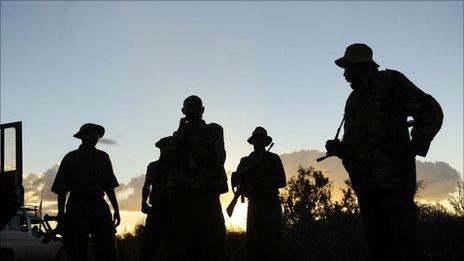
- Published22 December 2017
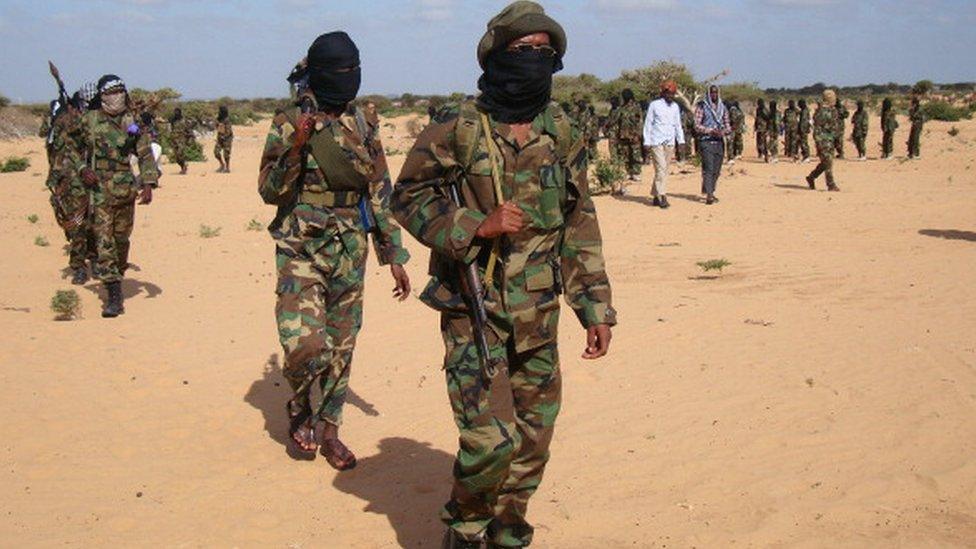
- Published19 October 2011
